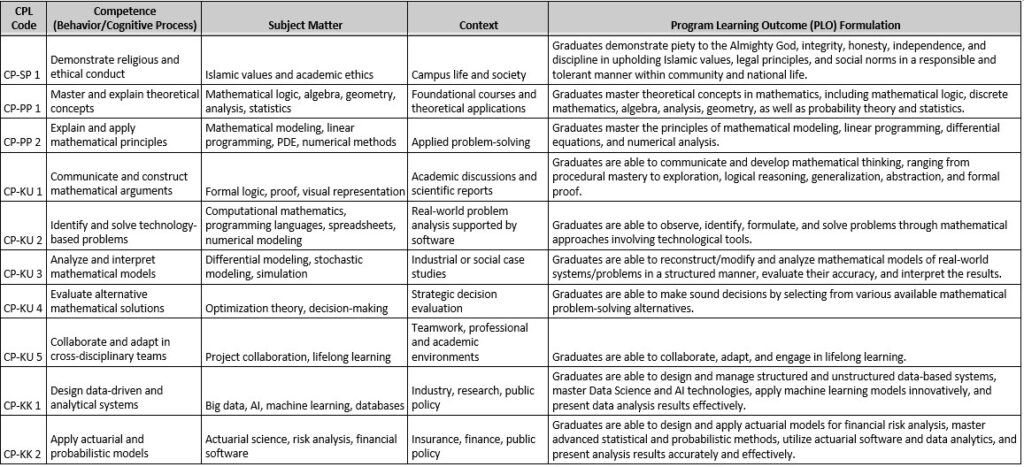Innovation, Green, Humanity, Moderate, Impact, & Sustainability
Curriculum 2025-2030
Higher education plays a strategic role in producing competent human resources who are prepared to face global challenges. In the era of the Fourth Industrial Revolution and digital transformation, the demand for graduates with strong technical expertise, analytical skills, and high adaptability continues to grow. Consequently, higher education systems must continuously evolve to align with advances in science, technology, and industry needs.
Outcome-Based Education (OBE) is a curriculum development approach that emphasizes measurable graduate learning outcomes (Capaian Pembelajaran Lulusan—CPL) aligned with the needs of employers and society. The OBE concept underscores that every element of the educational process—from curriculum design and teaching strategies to assessment methods—should be structured to ensure that students acquire relevant, applicable competencies. As a result, graduates are expected not only to master theoretical knowledge but also to apply it effectively in diverse professional contexts.
In developing its curriculum, the Mathematics Study Program, Faculty of Science and Technology, UIN Syarif Hidayatullah Jakarta, refers to the Presidential Decree of the Indonesian Mathematical Society (IndoMS) No. 028/Pres/IndoMS/SK/I/2022, dated 3 January 2022, concerning the IndoMS Recommendation for the Minimum Curriculum of Undergraduate Mathematics Programs in Indonesia. This decree provides standardized guidelines for the development of mathematics curricula that meet both national and international benchmarks, ensuring the production of graduates who are competitive across multiple sectors.
The adoption of the OBE curriculum is also consistent with national higher education policies, as stipulated in the Regulation of the Minister of Education and Culture of the Republic of Indonesia No. 3 of 2020 on the National Standards for Higher Education, and is aligned with the Indonesian National Qualifications Framework (KKNI) and the National Standards for Higher Education (SN-Dikti). Furthermore, this curriculum is designed to meet international accreditation standards, including those set by ASIIN (Accreditation Agency for Degree Programs in Engineering, Informatics, Natural Sciences, and Mathematics), thereby enhancing the global competitiveness of graduates.
Grounded in these considerations, the OBE curriculum in the Mathematics Study Program is expected to produce academically excellent graduates with strong moral integrity who are capable of making tangible contributions to society. Its implementation is supported by the integration of digital technologies and a Learning Management System (LMS) to improve instructional effectiveness and enable a more accurate and systematic outcome-based evaluation process.
Program Objectives

Program Learning Outcomes

Curriculum Map

Curriculum Structure
Click here for the module handbooks
SEMESTER I
| No | Code | Mandatory Course | Credit Points | ECTS |
| 1 | UIN6032201 | Islamic Studies | 4 | 4.267 |
| 2 | FST6091110 | Digital Literacy | 2 | 3.067 |
| 3 | FST6094101 | Basic Mathematics | 3 | 4.367 |
| 4 | NAS6112203 | Civics Education | 2 | 2.444 |
| 5 | FST6094116 | Algorithms and Programming | 3 | 4.133 |
| 6 | FST6094103 | Calculus I | 4 | 5.511 |
| 7 | FST6094221 | Technopreneurship | 2 | 2.756 |
| Total Credit Points | 20 | 26.544 |
SEMESTER II
| No | Code | Mandatory Course | Credit Points | ECTS |
| 1 | FST6094104 | Calculus II | 4 | 5.51 |
| 2 | FST6094106 | Elementary Statistics | 3 | 4.60 |
| 3 | NAS6112202 | Pancasila Education | 2 | 2.76 |
| 4 | FST6094102 | Discrete Mathematics | 3 | 4.13 |
| 5 | UIN6032202 | Islam and Science | 3 | 3.20 |
| 6 | FST6094112 | Elementary Linear Algebra | 4 | 6.13 |
| Total Credit Points | 19 | 26.33 |
SEMESTER III
| No | Code | Mandatory Course | Credit Points | ECTS |
| 1 | FST6094105 | Calculus III | 4 | 6.76 |
| 2 | FST6094107 | Mathematical Statistics | 4 | 6.76 |
| 3 | FST6094117 | Ordinary Differential Equations | 3 | 3.67 |
| 4 | FST6094114 | Analytic Geometry | 3 | 4.13 |
| 5 | FST6094110 | Introduction to Real Analysis I | 4 | 5.51 |
| 6 | UIN6033205 | Practicum in Qira’ah and Worship | 2 | 3.84 |
| Total Credit Points | 20 | 30.66 |
SEMESTER IV
SEMESTER V
| No | Code | Mandatory Course | Credit Points | ECTS |
| 1 | FST6094120 | Mathematical Modeling | 3 | 5.07 |
| 2 | UIN6016208 | Research Methodology | 3 | 4.13 |
| 3 | FST6094115 | Introduction to Numerical Analysis | 3 | 4.60 |
| 4 | UIN6014203 | English Language | 3 | 3.20 |
| 5 | FST6094109 | Complex Functions | 3 | 5.07 |
| 6 | Electives | 3 | 3.67 | |
| 7 | Electives | 3 | 3.67 | |
| Total Credit Points | 21 | 29.40 |
SEMESTER VI
| No | Code | Mandatory Course | Credit Points | ECTS |
| 1 | Elective Courses (Maximum of 24 credits depending on GPA) or MBKM/Impact Campus/Long-Term Mobility (20 credits) | |||
| 2 | ||||
| 3 | ||||
| 4 | ||||
| 5 | ||||
| 6 | ||||
| Mandatory | 0 | 0 | ||
| Electives | 20 | 30.67 | ||
| Total Credit Points | 20 | 30.67 | ||
SEMESTER VII
| No | Code | Credit Points | ECTS | |
| 1 | UIN6071207 | Field Work Internship | 4 | 7.82 |
| 2 | UIN6021206 | Community Service Program | 4 | 5.13 |
| 3 | FST6094369 | Mathematics Final Project Seminar | 1 | 1.83 |
| 4 | Electives | 6 | 10.13 | |
| Total Credit Points | 15 | 24.92 |
SEMESTER VIII
| No | Code | Mandatory Course | Credit Points | ECTS |
| 1 | UIN6000312 | Final Project | 6 | 11.0 |
| Total Credit Points | 6 | 11.0 | ||
| Total Credits (SKS or SCU) for Completion of Bachelor Program | 144 | |||
| Total Credits (ECTS) for Completion of Bachelor Program | 210.52 |
ELECTIVE COURSES
| No | Course | Course ID | Lecture (Face to Face) (SCU) | Total ECTS |
| 1 | Introduction to Database | FST6094301 | 3 | 3.43333333 |
| 2 | Introduction to Actuarial Mathematics | FST6094302 | 3 | 3.43333333 |
| 3 | Non Parametric Statistics | FST6094303 | 3 | 3.43333333 |
| 4 | Introduction to Data Mining | FST6094304 | 3 | 3.43333333 |
| 5 | Introduction to Risk Theory | FST6094305 | 3 | 3.43333333 |
| 6 | Categorical Data Analysis | FST6094306 | 3 | 3.43333333 |
| 7 | Introduction to General Insurance | FST6094307 | 3 | 3.43333333 |
| 8 | Introduction to Plans pension | FST6094308 | 3 | 3.43333333 |
| 9 | Introduction to Sharia Insurance | FST6094309 | 3 | 3.43333333 |
| 10 | Selective Capita | FST6094310 | 3 | 3.43333333 |
| 11 | Spatial Statistics | FST6094311 | 3 | 3.43333333 |
| 12 | Control Statistics Quality | FST6094312 | 3 | 3.43333333 |
| 13 | Introduction to Economics Micro | FST6094324 | 3 | 3.43333333 |
| 14 | Introduction to Statistical Computation | FST6094328 | 3 | 3.43333333 |
| 15 | Introduction to Macroeconomics | FEB6084202 | 3 | 3.43333333 |
| 16 | Natural Language Processing | FST6091911 | 3 | 3.43333333 |
| 17 | Linear Algebra | FST6094121 | 3 | 3.43333333 |
| 18 | Selective Capita | FST6094310 | 3 | 3.43333333 |
| 19 | Multivariate Statistics | FST6094313 | 3 | 3.43333333 |
| 20 | Time Series Analysis | FST6094314 | 3 | 3.43333333 |
| 21 | Biostatistics | FST6094315 | 3 | 3.43333333 |
| 22 | Analysis of Social Media | FST6094316 | 3 | 3.43333333 |
| 23 | Introduction to Financial Computing | FST6094317 | 3 | 3.43333333 |
| 24 | Introduction to Insurance Company Operations | FST6094318 | 3 | 3.43333333 |
| 25 | Sampling Techniques and Experimental Design | FST6094319 | 3 | 3.43333333 |
| 26 | Introduction to Actuarial Computing | FST6094320 | 3 | 3.43333333 |
| 27 | Advanced Actuarial Mathematics | FST6094322 | 3 | 3.43333333 |
| 28 | Number Theory | FST6094326 | 3 | 3.43333333 |
| 29 | High Performance Computing | FST6094327 | 3 | 3.43333333 |
| 30 | Introduction to Statistical Computing | FST6094328 | 3 | 3.43333333 |
